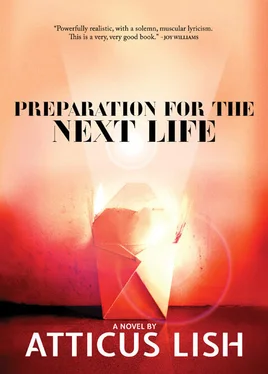Let’s go in the backyard. I wanna fight you now.
I’m not afraid of you.
The stand-off went on for three or four minutes. They went back and forth. Jimmy eyed the street for cops.
Fuck you, I’m not afraid of you, Charlie said walking away, outweighed. He went over to a tree and kicked it and went away, swinging his jersey, turning back to flip Frank off, calling out: Fuck you! and then coming back, because he had thought of something else:
Hey, enjoy those cigarettes I bought you.
I will.
Thanks for having my back. Thanks for that, after I bought you cigarettes. Thanks for your help.
Hey, Frankie smiled. Help you never.
Enjoy those cigarettes.
I’m gonna smoke them.
Fuck you.
Loser! You’re a loser. Seig heil.
Go preach your fuckin bible! Go home and whack off! I’ll never talk to you again, Charlie said and walked away. Then Frankie followed him, yelling, Yo! and Charlie went back to him and on the street where Indian women were pushing past with shopping carts they kept arguing.
Then Charlie went to Jimmy, who was leaning on the weathered fence, his eyes closed, face lifted up to the morning sun, a foot propped up behind him, his arms out holding the fence, posed like Jesus in the crucifixion, the bandana around his head like the crown.
It’s the drugs with him, Charlie said. He’s a druggie. The drugs come before everything.
Then do somethin about it, Jimmy sneered.
Frankie heard this.
Do something about what? he asked.
Ask your boy.
I’m askin you, nigga.
And I’m tellin you ask your boy.
And I’m askin you.
Jimmy made a derisive sound. He handled the situation that was developing a bit differently from either of them. I’m not getting excited like you tough guys, he said in his hoarse voice. He and Frankie went towards each other, but there was no chest-to-chest shoving. At one point, Frankie squared off with him and Jimmy dared him, Go ahead. Touch me. I’ll bury you right here. He spoke with his flat delivery, while Frankie argued with him at length. Jimmy cut him off.
Nobody cares about your shit. I’ll leave youse out here with your fuckin gooks and your fuckin stories, the both a youse.
You’re trippin.
You’re talkin. Jimmy made a talking puppet mouth with his four-leaf clover hand.
Frankie debated with him, saying Jimmy wasn’t the only motherfucker who’d been to jail. I met you in there, kid. He suggested that Jimmy was unfairly coming between him and his friend Charlie. All he had wanted was to go to the beach today. They could have gone to Rockaway. He appealed to Charlie James, holding out his arms with his numerical tattoos and his dirty hands. Not to mention that he wasn’t backing down, beloved.
You’re gettin off the subject.
What?
You gotta problem, do somethin.
Frankie wanted understanding.
I got nothing for you. Do it or don’t, Jimmy said. Yeah, ten years he had done. It was the same as life to him. So go ahead. Nobody cares. I don’t.
SHE TOOK THE SUBWAY to East Broadway in Manhattan, where it seemed that there were more immigration lawyers than in Flushing, as well as more job- and housing-referral services. The explanation for this was that East Broadway’s Chinese community had been created, in large part, through illegal immigration from Fuzhou. She went up a stairway next to a woman boiling peanuts in an electric cauldron on the sidewalk and wandered into a maze of second-floor offices being used for an assortment of businesses. The sign over one doorway said Li the Accountant; down the hall there was the Black Dragon Blue Body Tattoo Studio. Behind a crystal clear pane of plate glass, a tattoo artist in his thirties was engraving an outline drawing on the chunky arm of a shirtless young man. The steady buzzing of the stylus came through the glass.
Other businesses didn’t give their names, just bullet-point lists of services performed: Insurance, Register Marriage, Divorce, Government Housing, Apply For Benefit, Passport Without Needing Birth Certificate, H1 Visa, Send Baby To China. A clerk who sat alone at a computer in one of these offices, unattended by her employers, told Zou Lei that they weren’t real lawyers and that they couldn’t do everything the bullet points said they could do; Zou Lei should go to one of the many bona-fide lawyers in the area.
Taking her advice, Zou Lei returned to the street. The buildings were all shoved in next to each other like books in an overpacked library shelf. A sign for a law office stuck out like an index tab. It was attached to a modern building tucked between two tenements. She went into a mirrored-glass vestibule under CCTV surveillance. An emerald green ring lit up around the elevator call button when she hit it. The elevator opened and she saw the inside was paneled in dark wood like a lounge where Hong Kong tycoons drank cognac in the movies, another security camera running in the ceiling. She rode it to the attorney’s office on the second floor, a vertical distance of ten feet, which she could have climbed faster than the elevator moved, had there been stairs. The elevator moved slowly because of the expensive heavy inlaid wood. She got off in a polygonal marble-floored reception area.
They’ve squeezed a palace into this narrow building, she thought.
There was no one behind the reception counter. Through a section of glass wall, she saw women working at a row of heavy metal desks. In addition to their computers and phones, their desks were weighed down with stacks of manila folders. It was a busy office; the women were all working continuously, entering data, answering phones, handing files to other women who came from other rooms. The level of tension was equal to that of a fast food restaurant at the rush. Unlike the restaurant business, silence predominated. The exception to this was an extended discussion one clerk was holding with a client seeking legal advice, a slump-shouldered woman in an Izod shirt.
Zou Lei leaned around the glass wall partition and waited for several seconds looking in. When no one acknowledged her, she walked in and started down the line of desks, looking for anyone who was free. A young female wearing many-pocketed jeans asked, What do you want?
I want to do immigration.
Do you have a case open?
Zou Lei wasn’t sure how to answer.
So you want to file an application?
I don’t know. I think I can talk to a lawyer.
The lawyer can’t see you now.
Zou Lei asked when the lawyer could see her.
The woman hung up her phone and got up and walked Zou Lei out of the office and back to the reception area and had her sit in one of three curvy rosewood chairs and knocked on the lawyer’s door and asked him in a tiny murmur when he’d be free. The man’s voice told her fifteen minutes. She closed the door and told Zou Lei fifteen minutes and marched back into the secretaries’ office.
Zou Lei sat there looking at the diplomas on the walls. The lawyer had been recognized by the mayor’s office and by the Amoy Freemason Society of New York City. A framed piece of calligraphy spoke of leaping horses as a metaphor for the lawyer’s ability and spring rain for the author’s gratitude. On the reception desk, he had a little display of business cards on heavy paper stock listing all the languages he spoke. His voice continued talking on the other side of his door in English.
After a minute, she went back to the young woman to ask how much it would cost to talk to the lawyer.
Without a word, the girl put down what she was doing and marched back to the lawyer’s door and whispered to him again. Zou Lei could hear the Cantonese word for hundred. She came back and reported to Zou Lei it would be a hundred dollars.
Читать дальше












